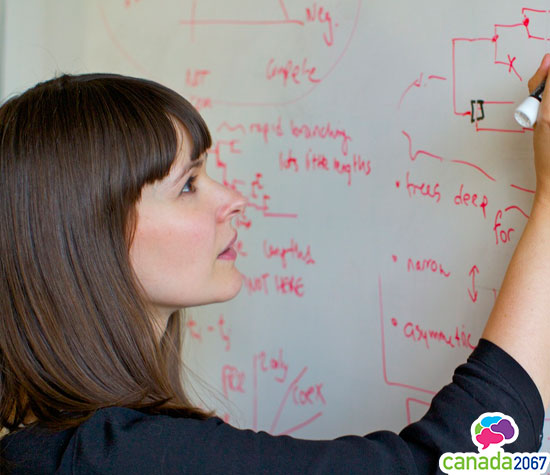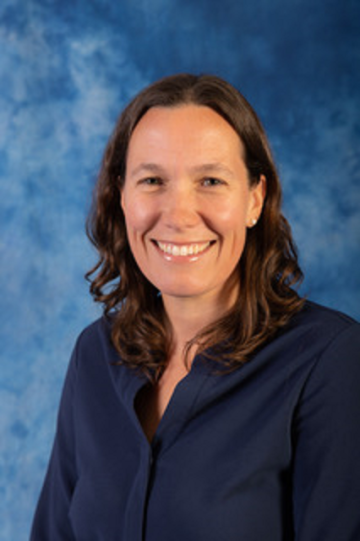Jennifer Gardy


About me
I was born/grew up in: Vancouver, BC, Canada
I now live in: Vancouver, BC, Canada
I completed my training/education at: BSc at the University of British Columbia, Graduate Diploma at McGill University, PhD at Simon Fraser University
What I do at work
In my current role with the Bill and Melinda Gates Foundation, I lead a team focused on helping malaria-endemic countries use better data to drive their decision-making around how they control malaria. We work with all kinds of data – clinical, epidemiological, climate, genetic, satellite imagery… you name it – to identify where malaria is occurring, how it’s spreading, and what the best strategies to fight the disease are. Ultimately, we believe we can eradicate malaria within the next 20-30 years – no more cases anywhere in the world.
When I worked at the British Columbia Centre for Disease Control, I led a research group studying infectious disease outbreaks. As the leader, I spent a bit of my time analyzing data but most of my time was spent leading my team. Leadership in scientific research involves going to meetings, looking for money to fund our research and writing papers It also involves giving presentations about what we've found and networking with colleagues around the world.
The main tool my team used for studying outbreaks was genome sequencing. We’d use specialized equipment to quickly read the complete DNA instructions that encode a bacterial or viral pathogen. We’d do this for tens, hundreds, or even thousands of pathogens at a time. Then we’d use bioinformatics tools - computer programs that we run on large, high-performance computing clusters - to process the genomes. Once the data has been processed, we’d use statistics, evolutionary biology, and epidemiology - the science of understanding diseases and how they spread - to figure out how an outbreak happened. Even though I don’t directly do this sort of work any more, scientists all over the world are using this technique to study outbreaks, including studying the COVID-19 pandemic.
My career path is
I've always loved infectious diseases so even in high school, I had a sense I'd end up in this field. What I didn't appreciate at the time was how following my interests during university would get me interested in other fields, like genetics, computer science, and communication. I also did not realize that I'd then be able to combine these with my passion for germs to create a totally niche career.
After I graduated high school, I set out to study infectious diseases. I completed a Bachelor of Science concentrating in cell biology and genetics. From there I went on to study biotechnology and then bioinformatics. When I completed my PhD I took a Postdoctoral Fellowship at the University of British Columbia. Here I conducted research in the area of microbiology and immunology. From here I went on to work at the British Columbia Centre for Disease Control and became an Associate Professor at the University of British Columbia. In this role, I used computational tools to analyze the genomes of infectious disease agents. Outside my day to day work, I worked on science communication projects, like documentary hosting for CBC Television. By being open to options and pursuing whatever it was that I was excited about at the time, I ended up with a really unique combination of skills.
These skills, experience and educational background led me to my current position at the Bill & Melinda Gates Foundation. Today, I don’t do or lead scientific research myself – instead, I help to set a research agenda that other scientists around the world follow. It’s a bit like being a master planner – my team discusses what scientific discoveries need to happen and what questions need to be answered in order for everyone in the global malaria community to be able to fight the disease better. Once we have this list of research priorities, we find the best people out there to do the work and give them the funds and support they need to do it. We work closely with groups like the World Health Organization to ensure we have a coordinated message and are working together towards a common goal – it’s a team approach, and definitely emphasizes how one of the most important skills for a scientist to have is the ability to work collaboratively with a range of different people.
I am motivated by
My favourite thing about my job is that every time we sequence a genome and peek under the hood of an outbreak, we're seeing data that nobody has ever seen before and learning completely new things - that sense of discovery is amazing! It's even better when you realize that those discoveries are helping combat infectious diseases. I also really love how much collaboration, communication, and travel there is in research science - I'm lucky to be able to travel the world, woking with colleagues in different countries and sharing our discoveries with them. This week, for example, I'm heading to a conference in Washington DC and only two weeks ago, I was in London, England meeting with some friends who do the same sort of research that I do!
How I affect peoples’ lives
What's cool about our work solving outbreaks with genomics is that we can see the results of what we do right away. In some scientific fields, you might make a discovery that takes years before its impact is felt by the public. With our work, when we're successful, we see fewer cases of a particular disease. We know our research is working right away, and most importantly, we're keeping Canadians healthy!
Outside of work I
I love travelling and enjoying all the different foods around the world, and I love cooking at home. That means I have to keep up with my exercise too, so I do a lot of Pilates and tennis. We have two dogs that keep us pretty active too - we love to take them hiking in the woods, and if it's fall, we use the hikes to look for mushrooms and other edible plants.
My advice to others
Passion and enthusiasm are the keys to success - follow your interests, no matter where they take you, and you'll always enjoy your day at the office, no matter where that office is!
- Literature and English language arts
- Home Economics/Family Studies
- Foods and Nutrition
- Science
- Was motivated by success
- Wanted to be in charge
- Liked reading
- Was really creative
- Felt great satisfaction in getting good grades
Related Topics
Partners

Let's Talk Science recognizes and thanks Jennifer Gardy for her contribution to Canada 2067.





